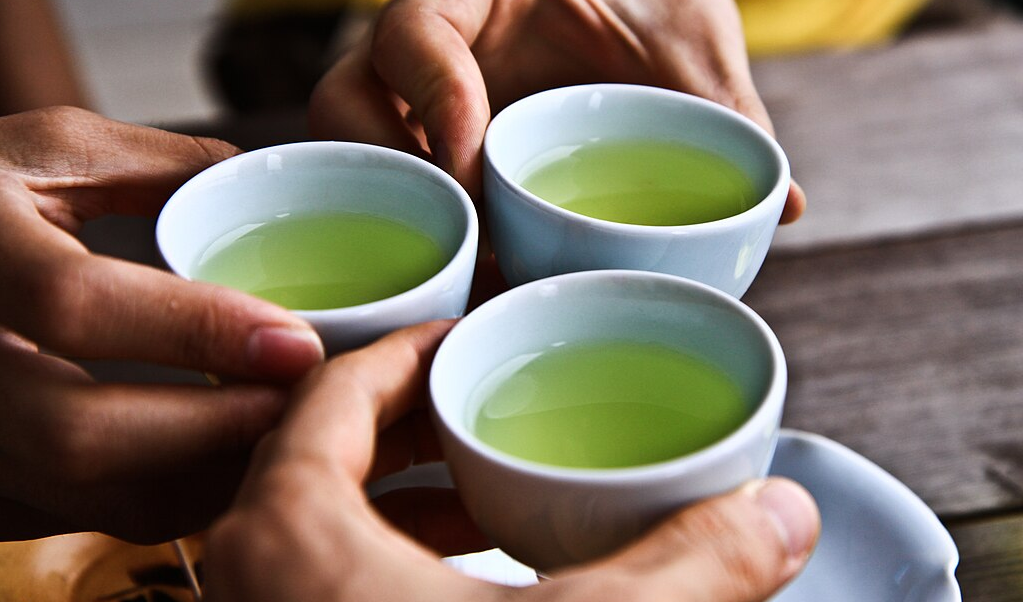It’s never too early or too late to start caring for your brain!
As we gracefully age, it’s only natural that our bodies and minds undergo changes. Yet, one of the biggest concerns that often accompanies aging is cognitive decline.
So, cheers to green tea for cognitive health!
The facts are…
According to the World Health Organization (WHO), approximately 50 million people worldwide grapple with dementia, with nearly 10 million new cases emerging each year.
As our global population continues to grow older, it’s predicted that this number could triple by 2050. These eye-opening statistics emphasize the urgency of finding effective ways to prevent and treat cognitive decline.
In recent years, green tea has emerged as a fascinating contender in the quest to safeguard cognitive health.
Originating in China but now enjoyed across the globe, green tea has gained popularity thanks to its myriad health benefits. Among its many virtues, the unique blend of antioxidants it houses, known as catechins, has piqued the interest of scientists for its potential role in protecting our brains from cognitive decline.
Today, I’m excited to unravel the science behind green tea and its potential as a natural shield against cognitive impairment. Plus, I’ll share practical tips on how to seamlessly integrate green tea into your daily routine, helping you harness its benefits for a healthier brain.
So, why not make yourself a cup of green tea and join me on this journey?
Here’s what we will cover:
- Understanding Cognitive Decline
- Science Behind Green Tea
- Link Between Green Tea and Cognitive Health
- Other Health Benefits of Green Tea
- Incorporating Green Tea into Your Routine
- Tips for Maximizing Green Tea’s Benefits
Keep in mind that beyond its potential benefits for cognitive health, green tea has also been associated with several other health perks. These include improvements in heart health, assistance with weight management, and a decreased risk of specific types of cancer.
1. Understanding Cognitive Decline
Cognitive decline refers to the gradual reduction in cognitive abilities such as memory, thinking, and reasoning that often comes with age.
While it’s perfectly normal to experience mild changes in cognition as we grow older, cognitive decline can also be a symptom of more serious conditions, such as Alzheimer’s disease and other forms of dementia.
Dementia is an umbrella term encompassing a range of symptoms that affect memory, thinking, and social abilities. It arises from damage to brain cells, impairing their ability to communicate effectively.
Alzheimer’s disease, the most common form of dementia, accounts for 60-70% of all cases.
As we age, our brains undergo various changes that render them more vulnerable to damage and degeneration.
These changes include
- reduced blood flow to the brain
- increased inflammation
- oxidative stress
Additionally, factors like genetics, lifestyle choices, and underlying medical conditions can also contribute to cognitive impairment.
2. The Science Behind Green Tea
Green tea, with its roots tracing back to China during the Ming Dynasty, has been cherished for centuries.
Unlike black tea, which is fermented and dried, green tea is made from unfermented tea leaves, preserving a rich concentration of beneficial compounds, including catechins.
Catechins belong to the polyphenol family—a group of natural compounds renowned for their antioxidant properties.
Within green tea, you’ll find various catechins, including epigallocatechin-3-gallate (EGCG), epigallocatechin (EGC), and epicatechin gallate (ECG).
Among these, EGCG takes the crown as the most abundant and potent catechin, constituting approximately 60% of the total catechin content in green tea.
But what makes catechins truly remarkable?
Scientific research has revealed that these compounds possess formidable antioxidant capabilities, capable of safeguarding our cells against the ravages of free radicals.
Free radicals, those unruly molecules, can induce oxidative stress in the body, leading to inflammation and cellular damage.
Inflammation and oxidative stress stand out as major players in the drama of cognitive decline.
By neutralizing free radicals, the catechins in green tea may serve as defenders, shielding our precious brain cells from harm and, potentially, decelerating cognitive decline.

3. The Link Between Green Tea and Cognitive Health
Now that we’ve unraveled the science behind green tea, let’s explore how it can be a friend to our brain. Several studies have been conducted to find the intriguing connection between green tea consumption and cognitive function.
A study published in the American Journal of Clinical Nutrition found that older adults who savored more than four cups of green tea daily enjoyed a 38% lower risk of cognitive decline than those who sipped less than one cup per day.
That’s good news for me considering I drink this much every day! And I’ve done it for years and years!
Meanwhile, research published in Psychopharmacology showed that participants who consumed green tea extract experienced improved cognitive performance and better connectivity between brain regions linked to working memory.
While the exact mechanism behind green tea’s protective effect on cognitive decline is still being unraveled, research suggests that its antioxidant properties, alongside other compounds like caffeine and L-theanine, may play a role in enhancing brain function.
4. Other Health Benefits of Green Tea
In addition to its potential benefits for cognitive health, green tea has garnered attention for its positive impact on heart health.
Studies indicate that the catechins in green tea can help lower cholesterol levels and reduce the risk of cardiovascular diseases.
Furthermore, green tea has also been examined for its role in weight management. Some research suggests that green tea may boost metabolism and facilitate fat burning, making it a valuable ally in weight loss efforts.
Lastly, green tea contains theanine—an amino acid associated with reduced stress and enhanced relaxation. This makes green tea an excellent choice for moments of self-care or when you’re feeling overwhelmed.
5. Tips for Incorporating Green Tea into Your Daily Routine
Now that we’ve uncovered the potential benefits of green tea for cognitive health, let’s discuss practical ways to make it a delightful part of your daily life. After all, integrating green tea into your daily routine isn’t just about boosting your overall health—it’s also a moment of relaxation and mindfulness.
- Start Your Day with Green Tea: Swap your morning coffee for a steaming cup of green tea. You’ll not only get a caffeine boost but also enjoy the antioxidant goodness of catechins.
- Sip Iced Green Tea: Replace sugary or artificially sweetened beverages with iced green tea. Add a slice of lemon or a sprig of mint for a refreshing twist. (This is my usual way, though I live it hot, too!)
- Healthy Snacking: Instead of reaching for your usual afternoon snack, pair a cup of green tea with a piece of dark chocolate. Dark chocolate is rich in antioxidants and can complement your brain-boosting efforts.
- Explore Green Tea Varieties: Experiment with different flavors and blends of green tea to discover your personal favorite.
- Consider Supplements: If drinking several cups of green tea per day seems daunting, you might consider green tea extract supplements. However, always consult with your healthcare provider before adding supplements to your regimen, especially if you take medications or have underlying medical conditions.
Additionally, you can explore various recipes incorporating green tea, such as smoothies, salads, and even desserts, expanding your ways to enjoy this versatile beverage.
6. Tips for Maximizing Green Tea’s Benefits
To make the most of green tea’s benefits, prioritize high-quality loose leaf or bagged tea from reputable sources. This ensures you’re getting the richest concentration of beneficial compounds, without any unwanted chemicals or fillers.
To ensure you’re reaping the full rewards of green tea, consider these additional tips:
- Hold the Milk: Avoid adding milk to your green tea, as it may reduce its antioxidant activity and potential benefits.
- Let It Steep: Allow your tea to steep for at least 3-5 minutes to maximize the extraction of beneficial compounds.
- Choose Freshly Brewed: Opt for freshly brewed green tea over bottled or powdered versions, as they may not contain the same levels of antioxidants.
- Timing Matters: Enjoy green tea in between meals to prevent potential interference with iron absorption.
In conclusion, while more research is needed to completely understand the relationship between green tea and cognitive health, the current findings are promising.
Integrating green tea into your daily routine can provide not only a refreshing respite but also the potential benefits of a sharper mind.
So, the next time you reach for that cup of coffee, consider giving green tea a chance. Maintaining a healthy lifestyle and including antioxidant-rich foods like green tea may help preserve your cognitive function as you age.
Remember, it’s never too late to start caring for your brain. Stay curious, stay active, and nourish your body and mind with the right nutrients. And as you savor each sip of that delightful green tea, may it be a toast to your well-being.
Happy sipping!
Sources for Further Study:
“Green Tea and Cognitive Function: A Review of Human Intervention Studies.” Nutrients, 2019.
“Green Tea Catechins and Brain Health: From Molecular Targets to Human Trials.” Journal of Nutrition, 2008.
“Green Tea Consumption and Cognitive Function in Middle-aged and Older Adults.” American Journal of Clinical Nutrition, 2017.
You may also be interested in this post on Rose centifolia, or Bacopa herb of grace.

